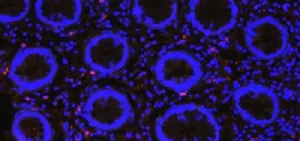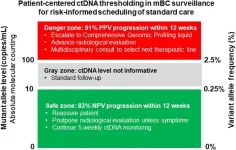(Press-News.org) Smart artificial microswimmers—small robots that resemble microorganisms like bacteria or human sperm—could potentially be used for targeted drug delivery, minimally invasive surgery, and even in fertility treatments.
These types of complicated tasks won’t be accomplished by a single microswimmer. Multiple swimmers will be necessary; however, it’s unclear how such groups will move within the chemically and mechanically complex environment of the body’s fluids.
“We know that whenever a swimmer has a neighbor, it swims differently,” says Ebru Demir, an assistant professor of mechanical engineering and mechanics in Lehigh University’s P.C. Rossin College of Engineering and Applied Science. “Birds fly in a V formation because it’s more efficient and it saves them energy. But for a group of microswimmers, we don’t know what the best formation looks like.”
Demir recently received funding through the National Science Foundation’s Faculty Early Career Development (CAREER) Program for her research combining artificial microswimmers with machine learning to build Smart Artificial Microswimmers (SAMs). By embedding AI into centimeter-scale robotic swimmers and comparing their behavior with predictions from simulations, her project aims to uncover the underlying physics that govern their movement in complex fluid environments.
The prestigious NSF CAREER award is given annually to junior faculty members across the U.S. who exemplify the role of teacher-scholars through outstanding research, excellent education, and the integration of education and research. Each award provides stable support at the level of approximately $500,000 for a five-year period.
To study how the swimmers move in both Newtonian and non-Newtonian fluids, Demir will insert microcontrollers that run reinforcement learning algorithms into 3-D printed autonomous robots that are 10-20 centimeters, or about 4-8 inches, in size. Fluids in the human body, such as blood, have non-Newtonian properties, meaning their viscosity, or resistance to flow, changes depending on the stress applied by the swimming body. She will make and use fluids with similar properties in experiments to verify the results of her simulations.
“These swimmers will each contain an AI brain that will give them decision-making capabilities, so they can determine for themselves how to swim better alone, and how to swim better with three or five or 10 companions. It will also be interesting to see if their behavior changes if they are allowed to cooperate and share information.”
For example, she says, a swimmer may move closer to its companion. As it does, it may determine that it’s moving faster. So it moves ever closer. But suddenly, it slows down. It then decides to retreat back to the previous distance where it maintained optimal speed.
“As the SAMs swim, they are constantly interacting with the environment, running that algorithm, and recalculating where they are in that formation and how fast or how efficiently they are moving. The goal is to find the best strategy for the cluster to swim together in a manner that’s both fast and efficient.”
Ultimately, the long-term aim is to insert micron-size (or centimeter-size if they’re being inserted in larger vessels like those in the gastrointestinal tract) artificial swimmers into the body where they could travel through the veins to deliver, for example, targeted chemotherapy drugs, or break up a blood clot without the need to thin a patient’s blood. They could also assist otherwise normal, high-quality human sperm in fertility treatments.
“In those cases, the sperm has good genetics, but maybe its tail is compromised, and so the swimmers could push the sperm toward the egg,” she says. “And that has been demonstrated by other researchers to work in a lab environment.”
Demir says it’s been gratifying to receive the CAREER award and learn that her work has earned approval from her peers. But what really drives her is the sense that her time in the lab has the potential to solve life-changing problems.
“As cliche as it sounds,” she says, “I want to use engineering to help humanity.”
About Ebru Demir
Ebru Demir is an assistant professor of mechanical engineering and mechanics in Lehigh University’s P.C. Rossin College of Engineering and Applied Science. Her research bridges thermo/fluids, biomedical engineering, and robotics, with a focus on artificial microswimmers for biomedical applications. Her research approach combines numerical simulations and experiments to investigate locomotion in complex fluids and biological environments, advancing applications such as targeted drug delivery, diagnostics, and waste elimination.
Demir’s interdisciplinary research leverages fluid mechanics/dynamics and machine learning techniques to address challenges in robotics, biomedical engineering, and advanced manufacturing. She investigates locomotion across multiple scales, from bioinspired artificial microswimmers to scaled-up intelligent robots, and contributes to flow-based medical device development through her experience in experimental design, simulations, and rapid prototyping.
Demir received both her BS and PhD in mechatronics engineering from Sabanci University (Istanbul, Turkey). She completed a postdoctoral research fellowship in the Department of Mechanical Engineering at Santa Clara University before joining Lehigh.
Related Links
Rossin College Faculty Profile: Ebru Demir
NSF Abstract (2442381): CAREER: Smart Artificial Microswimmers Unveiling Emergent Behavior in Finite Clusters via Experiments...
Mechanical Engineering & Mechanics at Lehigh University
Lehigh University: Institute for Data, Intelligent Systems, and Computation END
Teaming up tiny robot swimmers to transform medicine
Researcher Ebru Demir receives NSF CAREER Award to study how groups of AI-driven microswimmers move in biological fluids for potential applications in drug delivery, fertility treatments, and more
2025-02-24
ELSE PRESS RELEASES FROM THIS DATE:
The Center for Open Science welcomes Daniel Correa and Amanda Kay Montoya to its Board of Directors
2025-02-24
(Charlottesville, VA, Feb. 24, 2025) –
The Center for Open Science (COS) is pleased to announce the appointment of Daniel Correa, Chief Executive Officer of the Federation of American Scientists, and Amanda Montoya, Associate Professor of Quantitative Psychology at UCLA, to the COS Board of Directors. Both will serve three-year terms from 2025 to 2027, bringing valuable expertise in science policy, innovation, research methodology, and open science advocacy.
Daniel Correa is the Chief Executive Officer of the Federation of American Scientists, ...
Research suggests common viral infection worsens deadly condition among premature babies
2025-02-24
FOR IMMEDIATE RELEASE
Researchers say they found that infection with a common virus that can be transmitted from mother to fetus before birth significantly worsens an often-fatal complication of premature birth called necrotizing enterocolitis (NEC) in experiments with mice.
The research team, led by Johns Hopkins Children’s Center investigators and funded by the National Institutes of Health, says the new findings advance the search for better treatments for NEC — a relatively rare condition, but still the most common emergency intestinal complication in preemies.
A report on the study published Feb. 13 in Cellular and Molecular Gastroenterology ...
UC Irvine scientists invent new drug candidates to treat antibiotic-resistant bacteria
2025-02-24
Irvine, Calif., Feb. 24, 2025 — There’s an arms race in medicine – scientists design drugs to treat lethal bacterial infections, but bacteria can evolve defenses to those drugs, sending the researchers back to square one. In the Journal of the American Chemical Society, a University of California, Irvine-led team describes the development of a drug candidate that can stop bacteria before they have a chance to cause harm.
“The issue with antibiotics is this crisis of antibiotic ...
A history of isolation and alcohol use may impact depression treatment
2025-02-24
Ketamine can effectively treat depression, but whether depressed patients with alcohol use disorder can safely use ketamine repeatedly remains unclear clinically. To investigate this possibility, Mohamed Kabbaj and colleagues from Florida State University modeled aspects of human depression in rats using long-term isolation and assessed how isolation and alcohol exposure alter ketamine intake. The authors found that a history of isolation and alcohol use influence the rewarding properties of ketamine in a sex-dependent manner.
Female rats took ketamine more than males in general. Prior alcohol use increased female rat ketamine ...
A new strategy to promote healthy food choices
2025-02-24
Poor food decisions and eating habits can contribute to excessive weight gain and health problems. Nutritional labels meant to convey healthiness instead may create negative expectations about taste or pose as a time-constraining hurdle for shoppers. Doris Schicker and Jessica Freiherr, from the Fraunhofer Institute for Process Engineering and Packaging, led a study in JNeurosci to explore whether pairing food labels with a sensory stimulus, like odor, affects how people perceive foods and thus promotes healthy shopping. ...
Report reveals high levels of added sugar in US infant formula despite medical recommendations
2025-02-24
LAWRENCE — Added sugar, derived from cheap crops like corn, is bad for babies.
According to the American Heart Association, added sugars are full of energy but lack nutritional value, boosting odds of obesity, type 2 diabetes, cardiovascular disease and other health problems.
But a study published today from the University of Kansas in the Journal of Food Composition and Analysis shows most infant formulas on the U.S. market contain primarily added sugars rather than the healthier, naturally occurring lactose found in cow-milk base that would be best for babies because ...
Arctic study urges stronger climate action to prevent catastrophic warming
2025-02-24
Remember when 2°C of global warming was the doomsday scenario? Well, we're now staring down the barrel of something much worse. From the fish on your plate to the weather outside your window, everything's about to change.
A new study by an international team of researchers, including Jackie Dawson, full professor, Geography, Environment and Geomatics at the University of Ottawa’s Faculty of Arts, underscores the grave risks posed by insufficient national commitments to reducing greenhouse gas emissions.
“Our findings ...
New technique to measure circulating tumor DNA in metastatic cancer may improve disease progression surveillance and patient outcomes
2025-02-24
Philadelphia, February 24, 2025 – In metastatic cancer surveillance, monitoring the actual concentrations of circulating tumor DNA (ctDNA) may be critical. Researchers showed that absolute ctDNA concentration thresholds can be defined to rule out or predict impending cancer progression. They introduce a dual threshold model in a novel study in The Journal of Molecular Diagnostics, published by Elsevier, that may improve cancer surveillance, patient stratification, and risk-informed, personalized treatment by providing more accurate and timely assessment of disease progression.
Lead ...
One day of sleep deprivation can alter your immune system and increase inflammation
2025-02-24
New research reveals insight into the impact sleep quality has on a person’s immune system, and how it could be linked to the development of diseases such as obesity, diabetes, and cardiovascular diseases.
The study, published in The Journal of Immunology, found that even a single night of 24-hour sleep deprivation in young, lean, and healthy individuals altered the profile of immune cells that help regulate the immune system to resemble that of individuals with obesity - a condition known to drive chronic inflammation. This suggests that the immune system is highly sensitive to sleep and may adapt rapidly to changes in sleep pattern. ...
Study shows primary care and telehealth can deliver life-changing diabetes care
2025-02-24
Researchers at The University of Colorado Anschutz Medical Campus and colleagues at Massachusetts General Hospital, have found that people with diabetes can achieve the same positive results using advanced insulin technology when trained by their primary care providers (PCPs) or through telehealth as they would by seeing a specialist in person.
The study’s findings, which focused on Type 1 diabetes, are a major step forward in expanding access to cutting-edge care for people with diabetes, especially for those living in rural ...
LAST 30 PRESS RELEASES:
Public and patient involvement in research is a balancing act of power
Scientists discover “bacterial constipation,” a new disease caused by gut-drying bacteria
DGIST identifies “magic blueprint” for converting carbon dioxide into resources through atom-level catalyst design
COVID-19 vaccination during pregnancy may help prevent preeclampsia
Menopausal hormone therapy not linked to increased risk of death
Chronic shortage of family doctors in England, reveals BMJ analysis
Booster jabs reduce the risks of COVID-19 deaths, study finds
Screening increases survival rate for stage IV breast cancer by 60%
ACC announces inaugural fellow for the Thad and Gerry Waites Rural Cardiovascular Research Fellowship
University of Oklahoma researchers develop durable hybrid materials for faster radiation detection
Medicaid disenrollment spikes at age 19, study finds
Turning agricultural waste into advanced materials: Review highlights how torrefaction could power a sustainable carbon future
New study warns emerging pollutants in livestock and aquaculture waste may threaten ecosystems and public health
Integrated rice–aquatic farming systems may hold the key to smarter nitrogen use and lower agricultural emissions
Hope for global banana farming in genetic discovery
Mirror image pheromones help beetles swipe right
Prenatal lead exposure related to worse cognitive function in adults
Research alert: Understanding substance use across the full spectrum of sexual identity
Pekingese, Shih Tzu and Staffordshire Bull Terrier among twelve dog breeds at risk of serious breathing condition
Selected dog breeds with most breathing trouble identified in new study
Interplay of class and gender may influence social judgments differently between cultures
Pollen counts can be predicted by machine learning models using meteorological data with more than 80% accuracy even a week ahead, for both grass and birch tree pollen, which could be key in effective
Rewriting our understanding of early hominin dispersal to Eurasia
Rising simultaneous wildfire risk compromises international firefighting efforts
Honey bee "dance floors" can be accurately located with a new method, mapping where in the hive forager bees perform waggle dances to signal the location of pollen and nectar for their nestmates
Exercise and nutritional drinks can reduce the need for care in dementia
Michelson Medical Research Foundation awards $750,000 to rising immunology leaders
SfN announces Early Career Policy Ambassadors Class of 2026
Spiritual practices strongly associated with reduced risk for hazardous alcohol and drug use
Novel vaccine protects against C. diff disease and recurrence
[Press-News.org] Teaming up tiny robot swimmers to transform medicineResearcher Ebru Demir receives NSF CAREER Award to study how groups of AI-driven microswimmers move in biological fluids for potential applications in drug delivery, fertility treatments, and more




